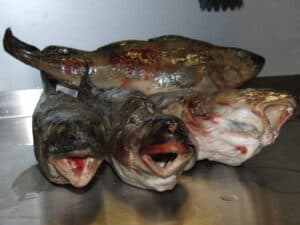Genetically modified organisms (GMOs) are opposed in the Environmental Protection Association because there are good arguments based on environmental protection to support Norwegian agricultural traditions, which take care of the land. This is seen with the eyes of both nature conservation and cultural conservation, as well as environmental protection. But some traces of genetically modified crops have been discovered in fodder, and permits for genetically modified carnation flowers have been adopted in Norway.
Seen from an environmental protection perspective, natural selection in nature together with good management is necessary to keep nature strong and healthy. Diversity is also desired because it can mean the difference between life and extinction when climate change or other environmental threats occur. Where there is diversity in nature, it is often possible that many species can survive environmental changes, which can occur suddenly.
Natural selection means that where there is variation some types will have a better chance of survival due to of their natural properties. Natural selection applies to humans as well as animals and plants and all other life. That people, through their understanding of breeding, should make optimal use of the environment by choosing bred plants and animals best adapted to the environment has contributed to sustainable agriculture.
GMOs, on the other hand, are a rapid development to meet the huge increase in demand for more expensive feed due to huge increases in world meals. Both GMO soya and GMO corn are grown on huge areas where the climate can create rapid growth. When the agricultural industry grows fodder on a continental scale, something happens to nature; it becomes extinct.
The Swedish Environmental Protection Agency has spoken out critically against new GMO permits for crops such as soya, maize and rapeseed for feed. There are also many other species such as carnations, which have been genetically modified to be able to form flowers with new colors and stems with longer durability. Two of these carnation species are reported to be permitted in Norway. These have product names Moonaqua and Moonvista.
Moonvista is carnation (Dianthus caryophyllus) FLO-40685-1 which has inserted genes from Petunia and from pansy to change colors in carnations. A gene from tobacco has also been inserted to give the flowers resistance to chlorsulfuron, which should prevent the growth of algae and bacteria where the flowers are stored during transport.
Moonaqua is garden carnation (Dianthus caryophyllus) FLO-40689-6 which is inserted gene from Petunia and from Viola and lit gene from ornamental snapdragon to change colors in garden carnation. A gene from tobacco has also been inserted to give the flowers resistance to chlorsulfuron, which will continue to be available from harvest to market.
Moonvista and Moonaqua have colors that are new to garden carnations. The change has been introduced in an artificial way, i.e. genetic modification by inserting foreign flower genes. Should these plants be used to create new lines with new colors, this would mean punishment unless the producers have given permission and the host country has given permission. These plants are protected by patents and therefore cannot be copied by others.
Links:



